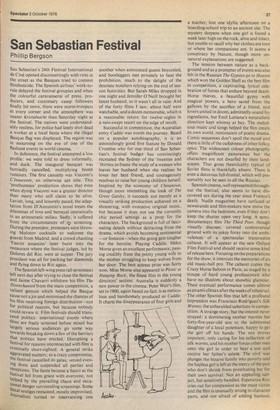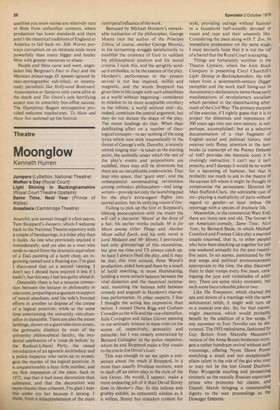San Sebastian Festival
Phillip Bergson
San Sebastian's 24th Festival International de ()lie opened disconcertingly with riots in the street as the Basques tried to commit filmfesticide. The Spanish airlines' work-torule delayed the festival groupies and when the colourful caravanserai of press, producers, and customary camp followers finally hit town, there were storm-troopers at every corner and the atmosphere was nearer Kristainachr than Saturday night at the festival. The natives were understandably restless, for police had lately shot dead a worker at a local fiesta where the illegal Basque flag was displayed. The region was in mourning on the eve of one of the flashiest events in world cinema.
In deference, the festival attempted a low profile: we were told to dress informally, and duck. The inaugural banquet was hurriedly cancelled, multiplying bomb rumours. The first casualty was Visconti's L'hitiocente, an otherwise apt title. This 'posthumous' production shows that even When dying Visconti was a greater director than many who still claim to be alive. Lavish, long, and leisurely paced, the adaptation from D'Annunzio's novel treats the dilemmas of love and betrayal operatically in an aristocratic milieu. Sadly, it suffered from the circumstances of is screening. During the premiere, protesters were throwing Molotov cocktails to welcome the guards from Madrid, and a crowd chanting 'Fascist assassins' later burst into the restaurant where the festival judges, led by Dolores del Rio, were at supper. The jury President was all for packing her diamonds and flying down to Rio again.
The Spanish left-wing press (all seventeen) left next day after trying to close the festival and Jaime Chavarri withdrew his film The Disenchanted from the main competition, a valiant gesture which helped the Basque cause not a jot and minimised the chances of his film receiving foreign distribution—not for political reasons, but because nobody could review it. Film festivals should transcend politics: international events where films are freely screened before mixed but largely serious audiences go some way towards breaking down a few of the barriers that politics have erected. Disrupting a festival for reasons unconnected with film is criminally short-sighted. A general strike aggravated matters; as a crazy compromise, the festival cancelled its galas, vetoed evening dress and suspended all parties and receptions. The fiesta became a fiasco as the festival fell from grace with everyone, not h.elPed by the prevailing chaos and occasional danger surrounding screenings. Some 1.estal vestiges remained, mostly improvised. Journalists turned to interviewing one
another when announced guests boycotted, and bootleggers met privately to beat the prohibition, much to the delight of the desolate hoteliers relying on the end of season festivities. But Sarah Miles dropped in one night and Jennifer O'Neill brought her latest husband, so it wasn't all in vain. And of the forty films I saw, about half were watchable, and a dozen memorable, which is a reasonable return for twelve nights in a rain-swept resort on the edge of revolt.
Successful in competition, the Australian entry Caddie was worth the journey. Based on a popular autobiography, it is an astonishingly good first feature by Donald Crombie who for one third of San Sebastian's festival budget has convincingly recreated the Sydney of the 'twenties and 'thirties to frame the study of a woman who leaves her husband when she realises he loves her best friend, and courageously resolves to raise her young children herself. Inspired by the economy of Chinatown, though more resembling the look of The Great Gatshy, it succeeds not merely as a visually striking production achieved on a shoestring, with evocative original music, but because it does not use the currently chic period settings as a prop for the characters. The background is full of fascinating details without detracting from the drama, which avoids becoming sentimental —or feminist—when the going gets tougher for the heroine. Playing Caddie, Helen Morse gives an excellent performance, passing credibly from the pretty young wife to the mother struggling to keep wolves from her door. The best actress prize was fairly won. Miss Morse also appeared in Picnic at Hanging Rock, the finest film in the young directors' section. Australia is suddenly a new power in the cinema. Peter Weir's film, set in 1900, again based on fact, is as meticulous and handsomely produced as Caddie. It charts the disappearance of four girls and a teacher, lost one idyllic afternoon on a boarding-school trip to an ancient site. The mystery deepens when one girl is found a week later high on the rock, alive and intact, but unable to ecall why her clothes are torn or where her companions are. It seems a conspiracy by Nature, though more unnatural explanations are suggested.
The tension between nature as a background and as a prompter of events was also felt in the Russian The Gypsies go to Heaven which won the Golden Shell as the best film in competition, a captivating, lyrical celebration of forces that endure beyond death. Horse thieves, a beautiful gypsy with magical powers, a hero saved from the gallows by the sacrifice of a friend, and lovers united in doom, admittedly sound fey ingredients, but Emil Lotianu's naturalistic direction kept whimsy at bay. The melodious music and songs helped the film create its own world, reminiscent of poetic drama. Comic sequences don't spoil the mood and there is little of the oafishness of other folksy epics. The widescreen colour photography offers magnificent panoramas but the characters are not dwarfed by their landscapes. That gross theatricality typical of Soviet films is thankfully absent. There is even a decorous full-frontal, which will presumably not be seen in all the Russias.
Spanish cinema, well represented throughout the festival, also seems to have discovered sex during the year since Franco's death. Nudie magazines have surfaced at newsstands and film-makers now move the camera into the bedroom, even if they don't keep the shutter open very long. A semidocumentary film The Third Poor, though visually discreet, covered controversial ground with its jokey foray into the ambivalences of a spectacular transvestite cabaret. It will appear at the new Oxford Film Festival and should receive some kind of release here. Focusing on the preparations for the show, it intercuts the memories of an old music-hall pro. The cabaret copies the Crazy Horse Saloon in Paris, as staged by a troupe of hard young professionals who have no illusions about showbiz glamour. Their eventual performance comes almost as an anti-climax after the weeks of rehearsal. The other Spanish film that left a profound impression was Francisco Rodriguez's Silk Worms, the unheralded substitute in competition. A strange story, but the interest never strayed: a dominating mother marries her forty-five-year-old son to the subnormal daughter of a local potentate, happy to get the girl off his hands. The son proves impotent, only caring for his collection of silk worms, and his mother forces other men onto the girl in order to bear a son and receive her father's estate. The civil war plunges the bizarre family into poverty and the hapless girl is left at the mercy of the pair who don't shrink from prostituting her for their own survival. Not an appealing sub
ject, but sensitively handled. Esperanza.Roy cries out for compassion as the mute victim
and the film is unusually strong in character parts, and not afraid of adding humour,
qualities you soon realise are relatively rare in films from unfamiliar contexts, where production has lower standards and there aren't the theatrical traditions of England or America to fall back on. Silk Worms portrays corruption on an intimate scale more powerfully than many bigger and louder films with greater resources to abuse.
People and films came and went, angstladen like Bergman's Face to Face and the Mexican prison-saga El Apando (graced by near-pornographic sub-titles), or incestuously parodistic like Hollywood Boulevard. Assassination at Sarajevo only came alive at the death and The Omen's sole horrifying aspect was its unearthly box-office success. The Humphrey Bogart retrospective provided welcome touchstones. To Have and Have Not summed up the festival.



































 Previous page
Previous page